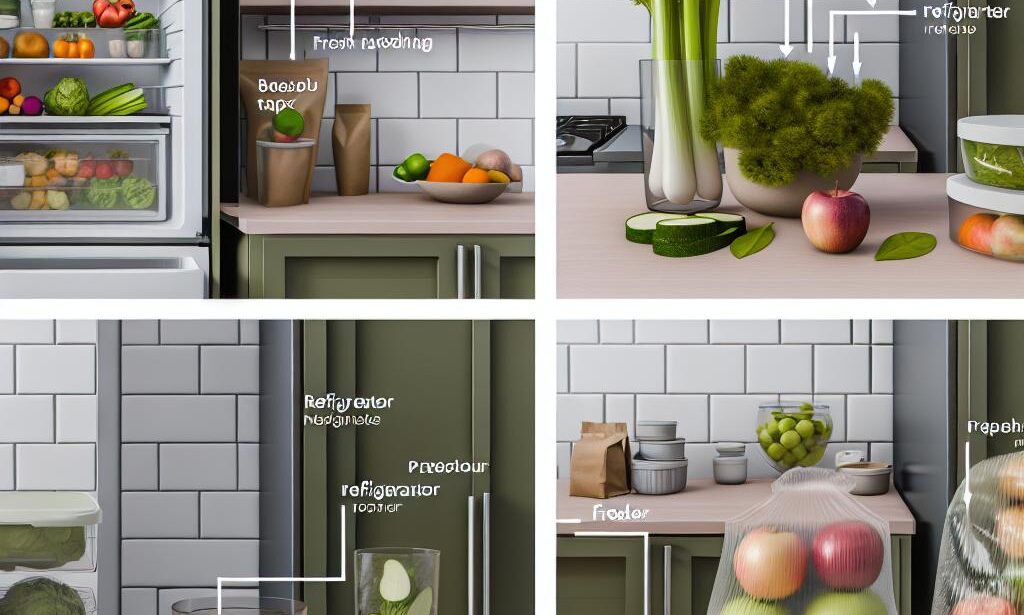In a world where food waste is a significant issue, finding smart strategies for prolonging food freshness is essential. By implementing simple yet effective techniques, individuals can reduce their food waste and save money in the process. From proper storage to utilizing preservation methods, there are numerous ways to extend the shelf life of various food items. In this article, we will explore some of the most effective strategies for keeping food fresh for longer periods of time.
Table of Contents
- Storing Fresh Produce Properly
- Utilizing Airtight Containers and Vacuum Sealers
- Understanding Expiration Dates and Shelf Life
- Utilizing Refrigeration and Freezing Techniques
- Minimizing Exposure to Air and Light
- Q&A
- Wrapping Up

Storing Fresh Produce Properly
When it comes to keeping your fresh produce at its best, proper storage is key. By following some smart strategies, you can prolong the freshness of your fruits and vegetables, reducing waste and saving money in the process.
One important tip is to store produce in the right environment. Some fruits and vegetables are best kept in the refrigerator, while others should be stored at room temperature. For example, items like apples, berries, and leafy greens should be refrigerated, while tomatoes, potatoes, and onions can be stored in a cool, dark place outside of the fridge. Additionally, keeping produce in the right humidity levels can also help extend its freshness. For instance, leafy greens and herbs benefit from higher humidity, while items like onions and garlic prefer lower humidity levels.
Another helpful strategy is to properly package your produce. Using breathable storage bags or containers can help regulate moisture and prevent premature spoilage. Additionally, keeping certain fruits and vegetables separate from each other can also help prevent them from ripening too quickly or developing off-flavors. By following these smart storage strategies, you can enjoy your fresh produce for longer periods of time.

Utilizing Airtight Containers and Vacuum Sealers
When it comes to prolonging the freshness of your food, can be game-changers. These tools help to eliminate air and moisture, which are the main culprits for food spoilage. By using airtight containers and vacuum sealers, you can extend the shelf life of your food and reduce waste.
One of the key benefits of using airtight containers and vacuum sealers is that they help to preserve the flavor and nutrients of your food. When air and moisture are kept out, the food is less likely to spoil and lose its quality. Additionally, these tools can also help to save space in your fridge or pantry, as they allow for efficient stacking and organization.
When choosing airtight containers and vacuum sealers, look for durable, BPA-free materials that are dishwasher safe for easy cleaning. Consider investing in a variety of sizes to accommodate different types of food items. With proper use and maintenance, these tools can be valuable assets in your kitchen for keeping your food fresh for longer periods of time.

Understanding Expiration Dates and Shelf Life
When it comes to keeping your food fresh, is crucial. By knowing how long your food will last, you can avoid waste and save money. Here are some smart strategies for prolonging food freshness:
- Check expiration dates: Always check the expiration dates on your food products. This will help you determine how long the item will last and when it should be used by.
- Store food properly: Proper storage is key to prolonging the shelf life of your food. Keep items in airtight containers, in the refrigerator, or in a cool, dark place to maintain freshness.
- Rotate your stock: When you buy new groceries, make sure to rotate your stock so that older items are used first. This will help prevent items from expiring before you have a chance to use them.
By following these strategies, you can ensure that your food stays fresh for as long as possible, reducing waste and saving money in the process.

Utilizing Refrigeration and Freezing Techniques
When it comes to preserving the freshness of food, is essential. By following smart strategies, you can prolong the shelf life of your groceries and reduce food waste. Here are some tips to help you make the most out of your refrigerator and freezer:
- Proper Storage: Store perishable items such as meat, dairy, and leftovers in airtight containers to maintain their freshness and prevent cross-contamination.
- Temperature Control: Keep your refrigerator at 40°F or below and your freezer at 0°F to ensure optimal food preservation.
- Organize Your Fridge: Arrange your fridge in a way that allows for proper air circulation, keeping the temperature consistent throughout.
Additionally, consider utilizing vacuum-sealed bags or freezer-safe containers to prevent freezer burn and maintain the quality of frozen foods. By following these strategies, you can extend the lifespan of your groceries and minimize food spoilage.

Minimizing Exposure to Air and Light
When it comes to prolonging the freshness of your food, is key. By following smart strategies, you can ensure that your food stays fresher for longer, reducing waste and saving money in the process.
One effective way to minimize exposure to air and light is to store food in airtight containers. This helps to create a barrier between the food and the surrounding air, preventing oxidation and spoilage. Additionally, storing food in a dark, cool place can help to minimize exposure to light, which can cause food to degrade more quickly. Consider using opaque containers or storing food in a pantry or cupboard to keep it out of direct light.
Another strategy is to use vacuum-sealed bags or containers to remove excess air from the packaging, further reducing the risk of spoilage. This can be particularly effective for items like meat, cheese, and produce, which are prone to spoiling when exposed to air. By taking these simple steps, you can help to prolong the freshness of your food and reduce waste in your kitchen.
Q&A
Q: Why is it important to prolong the freshness of food?
A: Prolonging the freshness of food helps to reduce food waste and save money, while also ensuring that the food we consume is safe and nutritious.
Q: What are some smart strategies for prolonging food freshness?
A: Some smart strategies include proper storage techniques, using airtight containers, keeping produce separate, and utilizing the freezer for long-term storage.
Q: How can proper storage techniques help prolong food freshness?
A: Proper storage techniques, such as storing food in the refrigerator at the correct temperature and in the right conditions, can help slow down the growth of bacteria and mold, thus prolonging the freshness of the food.
Q: Why is it important to use airtight containers for food storage?
A: Airtight containers help to prevent exposure to air and moisture, which can cause food to spoil more quickly. They also help to maintain the flavor and texture of the food.
Q: What are some tips for keeping produce fresh for longer?
A: Keeping produce fresh for longer can be achieved by storing fruits and vegetables in the refrigerator, using breathable bags, and keeping certain produce items separate from each other.
Q: How can the freezer be utilized for prolonging food freshness?
A: The freezer can be used to store food for longer periods of time, preserving its freshness and preventing spoilage. This can be done by properly packaging and labeling items for easy identification and use.
Wrapping Up
In conclusion, implementing smart strategies for prolonging food freshness can help reduce food waste, save money, and ensure that you and your family are consuming safe and nutritious food. By following the tips and techniques outlined in this article, you can extend the shelf life of your groceries and minimize the need for frequent trips to the grocery store. With a little planning and effort, you can make the most of your food purchases and enjoy fresh, high-quality meals for longer periods of time. Remember to always follow food safety guidelines and use your best judgment when assessing the freshness of your food. With these strategies in mind, you can make the most of your food and minimize waste in your household.

